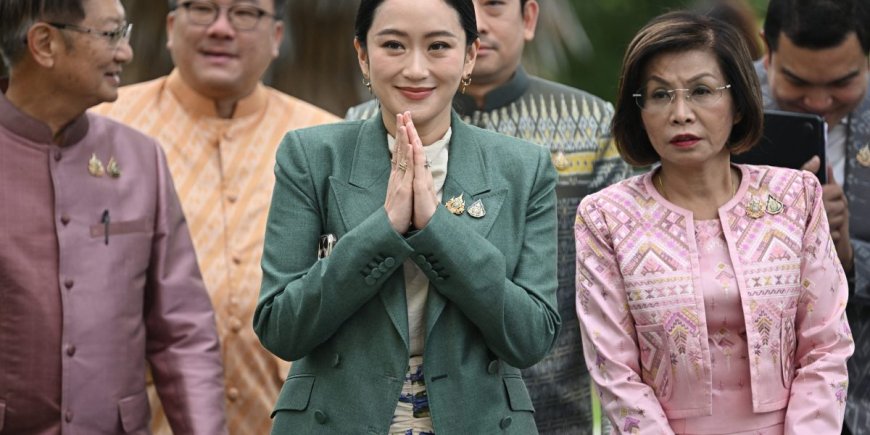Thai Prime Minister Suspended Amid Ethics Probe
Thailand's Constitutional Court has suspended Prime Minister Paetongtarn Shinawatra while investigating alleged ethical misconduct. The suspension raises concerns about the future of her family's political dominance. The court's decision could impact the country's economy and international relations.

Thailand’s Constitutional Court has suspended Prime Minister Paetongtarn Shinawatra from office pending a ruling on a petition seeking her permanent removal due to alleged ethical misconduct. This move deepens a crisis that could end her family’s long-standing influence in the country’s politics.
Paetongtarn is prohibited from exercising prime ministerial powers while the court reviews the petition filed by a group of senators. The court's decision to suspend her was supported by seven out of nine judges.
Although no deadline has been set for the court to make a decision, Paetongtarn has been given 15 days to respond to the allegations. In the meantime, Suriya Jungrungreangkit, a deputy prime minister and transport minister, will serve as the acting leader.
The petition accuses the prime minister of breaching ethical standards by criticizing the nation’s army in a leaked phone call with former Cambodian leader Hun Sen. This violation could lead to her dismissal. Despite calls for her resignation and the departure of a major party from her coalition, Paetongtarn, the youngest daughter of former premier Thaksin Shinawatra, has refused to step down.
The legal challenges faced by Paetongtarn and her father, who is currently on trial for a royal defamation case, suggest that their agreement with the pro-royalist establishment may be under strain.
The uncertainty surrounding Paetongtarn’s future and her coalition could hinder efforts to boost economic growth in Thailand, which has lagged behind neighboring countries like Indonesia and the Philippines. The political turmoil also raises concerns about Thailand's ability to negotiate lower U.S. tariffs on exports and pass crucial bills such as the budget for the next year.
According to Burin Adulwattana, chief economist at the Kasikorn Research Center, the suspension of the PM has increased political uncertainty and could potentially lead to a government that is unable to make significant decisions. Delays in passing the budget bill could have a substantial negative impact on the already fragile economy, especially in the face of U.S. tariffs.
Following the news of the suspension, the baht depreciated, while the yield on 10-year bonds decreased. The benchmark stock index, one of the worst-performing major equity markets globally this year, rose by 1.9% in anticipation that Paetongtarn's suspension would ease political tensions.
This court ruling poses a significant threat to Paetongtarn’s political career and her government, which is only 10 months old. She assumed office after her predecessor was removed in a similar ethics-related case.
Paetongtarn is the third member of the Shinawatra family to lead Thailand, following Thaksin and Yingluck Shinawatra. Yingluck remains in exile after fleeing in 2017 to avoid corruption charges.
Titipol Phakdeewanich, a political science lecturer, believes that this court decision could mark the end of the Shinawatra dynasty due to growing opposition against the prime minister and her perceived political inexperience.
The suspension came shortly after Paetongtarn announced her new cabinet line-up in an attempt to strengthen support within her coalition government. While she will step down from the top office, she is expected to retain a position in the cabinet as the Minister of Culture.
Paetongtarn’s government faced a crisis when a leaked phone recording revealed her siding with the Cambodian leader in a border dispute, rather than supporting the Thai army. This incident sparked public protests demanding her resignation.
Before the dispute, the Shinawatras and the Huns of Cambodia had a close relationship. However, the border conflict has strained ties between the two countries, with Hun Sen calling for a leadership change in Thailand.
Paetongtarn’s popularity has plummeted, with only 9.2% of respondents supporting her in a recent poll. Despite accepting the court's decision, she continues to face legal challenges from opponents seeking her removal.
Napon Jatusripitak, from the Thailand Studies Program, believes that the collapse of Paetongtarn's administration is inevitable, indicating that her government may reach a breaking point before the court reaches a final verdict.
What's Your Reaction?
 Like
0
Like
0
 Dislike
0
Dislike
0
 Love
0
Love
0
 Funny
0
Funny
0
 Angry
0
Angry
0
 Sad
0
Sad
0
 Wow
0
Wow
0


























































































































































